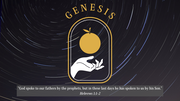|
A quick glance over Old Testament canon reveals a unique trait of the Hebrew religion: genealogies. It should not surprise us that the primeval history of the Jews contains a number of these. Why is that? The recorded histories are about the People of God—the family of God chosen from among the despised of the world—fulfilling their fruitfulness mandate. More than this, these genealogies are Israel’s way of looking for the promised Seed of Eve who will crush the serpent’s head. Their faithfulness to the gospel in embryonic form is witnessed through Moses’ preservation of these early family trees. What we see written down here are the attributes of a pious line of men. What are their attributes? Sticking with a God who sticks with them.
0 Comments
Moses takes the time to restate some pre-Fall truths. In light of the unrighteous line of Cain, the righteous line of Seth is founded on the ethics of God. Morality is defined by God as the Creator of all things, and Moses wants to make sure we are aware of this as he introduces the ancestor of God’s people. This repetition seems like it was written for our time, where culture aims to redefine gender and marriage. While our culture is very imaginative in sinning, it is no more depraved than the line of Cain. Family, work, marriage, and life; these are the pillars of Christian ethics, and they find their foundation in the Book of Genesis. |
About the seriesThe Book of Genesis is the starting point of God’s covenant with His people. This book gives us the historical sketch of the creation, fall, and redemption of the world. Genesis is also a perfect litmus test to gauge whether or not a person fully trusts in the authority, sufficiency, and inerrancy of Scripture. Categories
All
|

